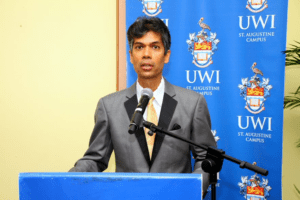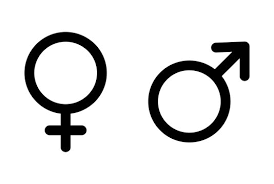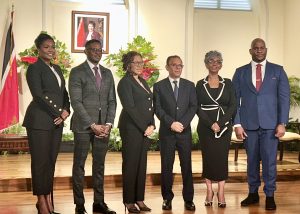
MANY consumers in the Caribbean are not aware of the role of advertising and its subliminal messages which are not to inform but to persuade potential consumers to purchase and continuously use popular products.
During the past decade, Caribbean women have begun to view themselves differently. This is a direct result of the influence of magazines such as Vanity Fair, Vogue, Good Housekeeping and Cosmopolitan. Such literature redefined gender relations in the Caribbean, especially with its pictures of the ideal glamorous woman, skin and hair products, clothes and weight loss advice. This is coupled with increased advertising of plastic surgery procedures.
Some Caribbean women are becoming more like their foreign counterparts- self-conscious and fashionable. Furthermore, television shows and movies such as Sex in the City and Ally McBeal had a similar impact as the magazines, as they served to encourage women in the Caribbean to explore their fantasies, aspire for more sexual freedom and become more aware of their sexuality. Nothing is wrong with this but there is a real problem that is not being adequately addressed. The question we must ask ourselves – has the media deliberated created women as sex objects?
Caribbean men are also lured into this persuasive advertising. Magazines such as Men’s Health, Esquire and Muscle and Fitness provide advice columns and reports on the need for the ideal man in today’s society to be trim and firm.
Furthermore, the ads for popular drugs such as Viagra and Cialis to cure impotency are regularly featured on cable television and US magazines. There is considerable exaggeration as if this was the long-awaited wonder drug specifically developed to save marriages and strengthen the family as a social group.
Some Caribbean men and women undergo a phase of frustration-aggression as they seek to emulate, with little success, the women in the media. The effect is that some Caribbean men have felt emasculated by the sudden independence of their wives and girlfriends who are financially and emotionally independent.

This radical transformation of women has been viewed by Caribbean men as a type of moral corruption. This show is popular in the Caribbean and a favourite among the men and boys who enjoy the scantily clad females on the beach.
The public revelation of Ellen de Generes and Rosie O’Donell, and other actresses and actors as gay, transgender have been internalised by a small segment of the Caribbean population to believe that is an acceptable lifestyle. Likewise, the US news snippets of the annual Pride parades and such television series as Queer as Folk have also made alternative lifestyles seem more acceptable.
The uncomfortable reality is that in Latin America and the Caribbean, with their relatively conservative values, do not warmly embrace any lifestyle that is not heterosexual. Furthermore the categories of ‘male’ and ‘female’ remain as the acceptable norm.
Those Latin and Caribbean men who are socialised into alternative lifestyles, by the US media, are ostracised, ridiculed and alienated by members of their communities and workplaces. In islands, as Jamaica, gays could be killed for admitting or adhering to such a lifestyle. Consequently, those on the LGBTQI spectrum sometimes suffer from personality disorders as they experience alienation.

Also, they are often ostracised from mainstream society and some are forced to live double lives to maintain jobs and friendships. A few are disillusioned due to misguided beliefs that the Caribbean society could be as tolerant as the United States.
Caribbean children (five to 12 years old) have become more disrespectful to their parents, displayed less social skills among their peers and more prone to deviancy at primary schools. This is attributed to the influence of such cartoons as The Simpsons and South Park. Bart Simpson, a character on the Simpsons, along with Beavis and Butthead are rebellious, rude and underachievers. Even worse is the racism and bigotry emanating from each episode of South Park which has attained celebrity status in many homes in the United States.
For some, it seems as if the Caribbean and Latin America are become ‘liberated’ or liberal. Others are concerned that the nuclear family in the Caribbean is being slowly undermined. But it is difficult to change a fast-paced society that is following the path of social media influencers.
Dr Jerome Teelucksingh is an activist. He initiated the inaugural observances of International Day for the Elimination of Violence Against Men and Boys (January 31) and World Day of the Boy Child (May 16). He has made academic presentations at tertiary institutions including Harvard University and Oxford University.
See other articles by Dr Jerome Teelucksingh on AZP News:
Naps Girls: From Humble Beginnings to Excellence
US Media Creates Cultural Dependency in the Caribbean
Bloodless Revolution to Save Lives in Developing Countries
The Need for a Social and Moral Revolution
The Law of Supply and Demand in Developing Countries
End the Dependency for Developing Countries
T&T Carnival and the Emperor’s New Clothes
The Influence of Labour on Caribbean Integration
The illusion of political Unity
Presbyterians in Trinidad: Humble Missionaries, Local Workers
Religious Plurality: Curse or Blessing
Caribbean Youth Need Optimism, Patriotism
Rethinking Identities in Caribbean, Latin America
November 19: All Inclusive International Men’s Day
Should International Agencies be Blamed for Unemployment
A Need to Observe Word Unemployment Day
An Ideology for the Trade Union Movement
The Man who Couldn’t be Prime Minister
Social Outburst vs Social Revolution
Challenges of the Men’s Movement
If George Floyd was Denied Parole
The Meaning of Indian Arrival Day in T&T
International Men’s Day – A Way of Life
Wounds that cause school violence
May Day: A Time for Solidarity, Strength
Who Coined the Term ‘Black Power’
The illusion of political Unity
Presbyterians in Trinidad: Humble Missionaries, Local Workers
Religious Plurality: Curse or Blessing
Caribbean Youth Need Optimism, Patriotism
Rethinking Identities in Caribbean, Latin America
November 19: All Inclusive International Men’s Day
Should International Agencies be Blamed for Unemployment
A Need to Observe Word Unemployment Day
An Ideology for the Trade Union Movement
The Man who Couldn’t be Prime Minister
Social Outburst vs Social Revolution
Challenges of the Men’s Movement
If George Floyd was Denied Parole
The Meaning of Indian Arrival Day in T&T
International Men’s Day – A Way of Life
Wounds that cause school violence
May Day: A Time for Solidarity, Strength
Who Coined the Term ‘Black Power’
![]()












